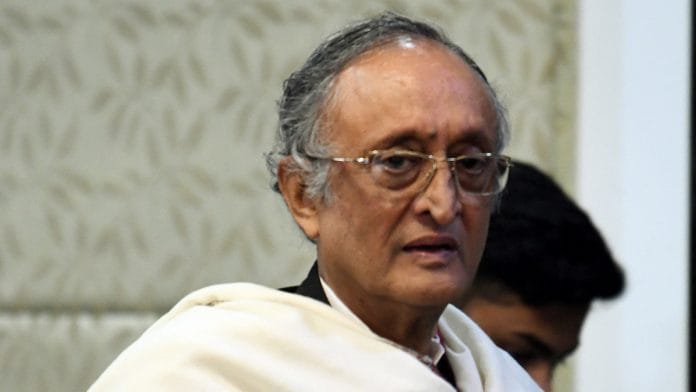New Delhi/Kolkata: There is nothing “atmanirbhar” (self-reliant) about the Union Budget 2022-23 that was presented by Finance Minister Nirmala Sitharaman Tuesday, according to Amit Mitra, principal chief adviser to West Bengal Chief Minister Mamata Banerjee, and the state’s former finance minister.
In an interview to senior consulting editor Jyoti Malhotra in ThePrint Uninterrupted, Mitra called the Budget “a pie in the sky” — an empty promise — and said it failed to address poverty and unemployment adequately.
Soon after the Budget was presented, Mamata Banerjee took to Twitter and proclaimed that it had “zero for the common man”, while Mitra had called it a “hoax”.
Mitra, an economist, was finance minister of Bengal for 10 years before he was appointed last year as the chief adviser to the CM.
Mitra indicated that the theme of atmanirbharta, which was peppered throughout Finance Minister Nirmala Sitharaman’s Budget speech (with at least seven mentions), lacked credibility, especially since India’s imports from China rose by about 46 per cent in 2021.
“The pandemic is an excuse… China’s exports to India to grow by 46.1 per cent means that those items will not be produced in India, they will not be strengthened. So, it’s not an atmanirbhar Budget,” Mitra said.
Also Read: Modi govt continues infra push, Budget shows big jumps for highways, transport & tap water
‘Poverty and unemployment ignored’
According to Amit Mitra, the Centre had failed to address key issues of poverty and unemployment in this Budget. In an apparent reference to Pew Research findings, Mitra said that there were 134 million poor people in the country now (as opposed to the 60 million expected prior to the pandemic). “After 45 years, India has come back to the global list of extremely poor,” Mitra said.
This, coupled with rampant unemployment and a lack of fiscal stimulus measures, does not bode well for the economy, Mitra claimed.
“In developing European countries, which have an emerging market, 4.7 per cent of their budget is fiscal stimulus. Now our finance minister has tried to increase that a little by making statements on capital expenditure, but first you must stimulate the demand to employ people… For that you need to put money in the hands of the people,” Mitra said.
The former state finance minister suggested that West Bengal’s fiscal policies had been sounder than that of the Centre, pointing out that while the country’s Gross Domestic Product (GDP) fell by 7.7 per cent in pandemic-hit 2020-21, West Bengal’s grew by 1.2 per cent.
In the interview, Mitra also shared anecdotes to illustrate the “top-down approach” of the Modi government.
‘Cabinet ministers didn’t know about demonetisation’
A vocal critic of the 2016 demonetisation, Mitra claimed that even Union cabinet ministers were kept in the dark until the last minute.
“There are cabinet ministers who told me when demonetisation happened, they were called into a room thinking… some new programmes will be discussed but their cell phones were taken away and then they saw on the TV screens Prime Minister making the announcement,” Mitra said. “Apparently one of them got up to say that he wants to leave since the announcement has happened… He was told to wait because the English speech was to follow.”
However, he remembered the late Arun Jaitley’s stint as Union finance minister with fondness. “When late Arun Jaitley was there, we had discussions. We took a tea break when there were differences. In the tea break, we would sit and thrash out our differences and come back to the meeting and then a consensus would take place which would be announced in the meeting itself,” Mitra recalled.
According to him, the Centre no longer has “an open mind”, and even though the Finance Department held a meeting with the states before the Budget, it did not yield anything positive.
(Edited by Asavari Singh)
Also Read: Budget has many things for the common man. Look closely, they are coming






